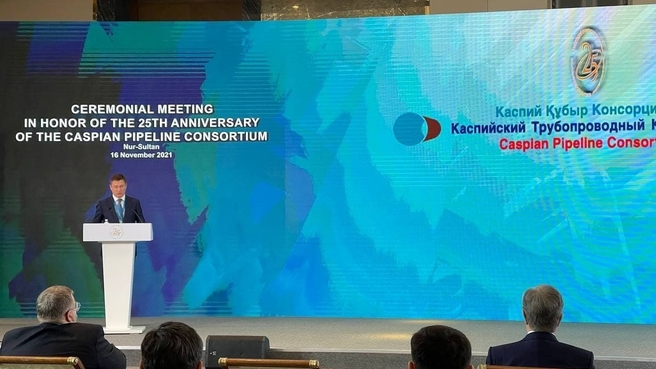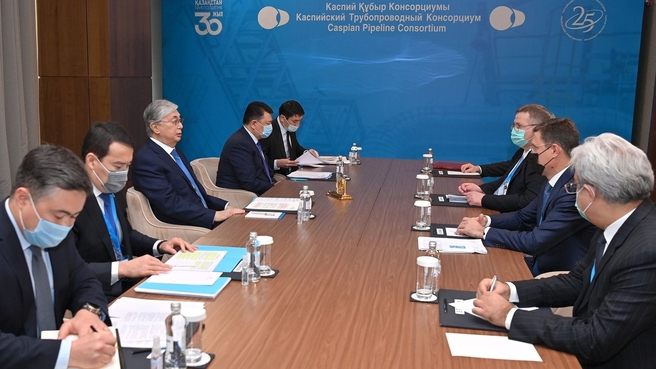The officials reviewed the development of the republic’s energy potential with Russian fuel and energy sector companies’ participation, and cooperation in transport and logistics.
During their working trip to Kazakhstan, deputy prime ministers of the Russian Federation Alexander Novak and Alexei Overchuk met with President of the Republic of Kazakhstan Kassym-Jomart Tokayev.
At the meeting, they discussed the prospects for promoting trade and economic relations in the EAEU and in the fuel-and-energy sector, including the development of green energy, the civilian nuclear power industry and hydrogen power.
“Russia is working hard on implementing a green policy. It has drafted a strategy for low carbon economic development up to 2050. The strategy notes the important role of nuclear power as a low carbon energy source. We are also developing mechanisms for funding our green policy,” said Alexander Novak.
They also reviewed opportunities for transport and logistics cooperation and plans for reciprocal recognition of vaccine certificates.
During his visit to Kazakhstan, Mr Novak attended a meeting of the Caspian Pipeline Consortium to mark the 25th anniversary of signing the contract by the shareholders. During the meeting, Mr Novak conveyed congratulations from President Vladimir Putin and Prime Minister Mikhail Mishustin.
Mr Novak noted the unique importance of the operating pipeline for Russian-Kazakhstani relations. “This is a unique joint project by our countries and it includes the world’s leading energy companies. In the years it has been operating, it has proven its strategic relevance and economic efficiency. Today, it is not only the shortest but also the most reliable route for transporting Caspian oil to world markets. This project is of key importance for the buildup of Russia’s energy and transport potential. For Kazakhstan, it has provided major support for developing its national economy and the best export route for access to world energy markets,” said Mr Novak.
In a quarter century, over 750 million tonnes of oil have been exported to world markets via the Tenghiz-Novorossiysk Pipeline system. Its capacity will soon exceed 80 million tonnes of oil a year.
“The consortium’s activities meet the highest environmental standards, including the consistent de-carbonisation of the economy,” Mr Novak added.
Alexei Overchuk emphasised the rapid development of trade and economic cooperation between Russia and Kazakhstan. “We think it is of the essence to expand to new areas of cooperation. We are considering several promising industries such as energy – including renewable energy sources – mining, information and communication technologies, and transport infrastructure,” the Deputy Prime Minister noted.
The Deputy Prime Minister highlighted regional ties as a key element of economic cooperation between the two countries. “Interregional and cross-border trade accounts for about 70 percent of the total turnover. Tatarstan, the Astrakhan Region, Moscow and St Petersburg are the key Russian regions that have regional partners,” Alexei Overchuk said.
The Deputy Prime Minister noted that in 2021, while Kazakhstan was chairing the EAEU, important decisions were made that contributed to the deepening of Eurasian integration.
In regard to transport and logistics cooperation, the Russian official noted the implementation of the Europe-Western China transport corridor project and the Meridian motorway. “We are working in close contact with our Kazakhstani colleagues to implement a major project, the development of the Europe - Western China transport corridor. We are also considering the parameters for the planned Meridian motorway. It is important to make every effort to increase the throughput and reduce the shipment time for goods across our countries,” Alexei Overchuk added.
He also reaffirmed Russia’s interest in expanding contacts in the field of education and youth policy. “As a matter of priority, we are ready to respond to your needs regarding training for your Russian language teachers, and to facilitate the transfer of modern teaching methods and technologies,” Alexei Overchuk said.













